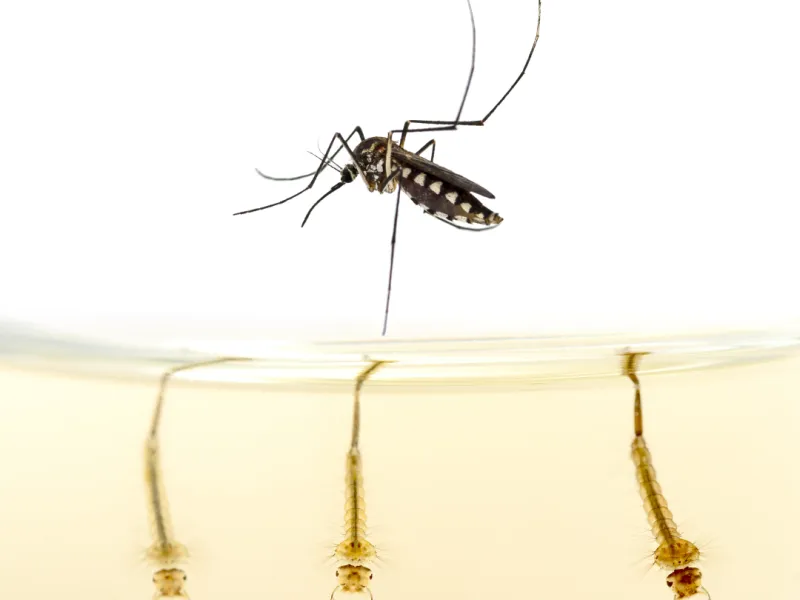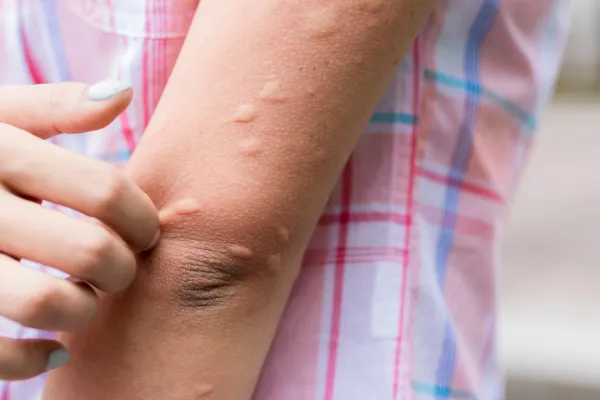Mosquito Life Cycle in DMV

Complete Mosquito Life Cycle: Why Timing is Everything for Effective Mosquito Control
In Maryland's warm, humid climate, mosquitoes aren't just a summer nuisance—they're a season-long threat to comfort and health. At PestNow, we specialize in helping homeowners reclaim their yards from these biting pests. But to truly control mosquitoes, it's important to understand how they live and reproduce.
Let's dive into the four-stage mosquito life cycle and explore why targeting mosquitoes at the right time, with monthly treatments from April through October, is the key to effective long-term control.
1. Egg Stage: The Beginning of the Cycle
Mosquitoes begin their life cycle when a female lays eggs in standing water, from a clogged gutter or birdbath to a puddle in a flowerpot. Some mosquito species lay eggs directly on the water's surface, while others deposit them in damp soil. When it rains, there is enough water for the mosquitoes to continue developing.
Key fact: A single female can lay up to 300 eggs at once.
Timing: Eggs can hatch in as little as 24 to 48 hours under warm, moist conditions.
Why it matters: Eggs are small and often go unnoticed, but are the starting point for infestation. Professional inspections and treatments early in the season—starting in April—can interrupt this stage before populations explode.
2. Larval Stage: The "Wigglers" in the Water
Once the eggs hatch, the larvae emerge. These larvae, often called "wigglers," live in water and feed on organic matter like algae and microorganisms. They come to the surface frequently to breathe through a tube-like structure called a siphon.
Key fact: Mosquito larvae undergo four growth stages (instars) before becoming pupae.
Timing: This stage lasts about 5 to 14 days, depending on temperature and species.
Why it matters: Larvae are easier to eliminate than adult mosquitoes. Our Yardguard treatment, which includes mosquito control, targets common breeding areas where larvae thrive. If untreated, larvae will quickly develop into pupae and then full-grown, biting adults—so this is a critical window for intervention.
3. Pupae Stage: The "Tumblers" Preparing for Flight
Mosquito pupae do not feed, but they remain highly active in water. They're often called "tumblers" because they flip and move around when disturbed. During this stage, the mosquito is transforming into its adult form.
Key fact: This is a short stage—just 1 to 4 days—but it's when mosquitoes undergo complete metamorphosis.
Timing: Once the adult is fully developed, it emerges from the pupal casing and begins to fly almost immediately.
Why it matters: This is the final opportunity to stop mosquitoes before they start flying and biting. Our mosquito control treatments are appropriately timed to break the life cycle before it completes.
4. Adult Stage: The Biters and Breeders
Adulthood is the stage that everyone dreads. Adult mosquitoes emerge ready to feed and breed. Males feed on nectar, but females require a blood meal to produce eggs, starting the cycle all over again.
Key fact: Adult mosquitoes can live from several days to a few weeks, depending on species and environment.
Timing: Females can begin laying eggs just days after feeding, so populations grow very quickly if left untreated.
Why it matters: Adult mosquito control is essential, but it's not enough. By the time they fly around your yard, several more generations are likely already developing in nearby water sources. Our professional treatments target all stages of life to ensure a peaceful outdoor space for you and your loved ones.
Why Monthly Treatments Matter
In Baltimore, mosquito season typically spans from early spring through late fall. Missing even one month can allow the life cycle to restart, and within weeks, you're back to swatting. This means that a missed treatment can lead to a rapid increase in the mosquito population, undoing the progress made in the previous months.
That's why PestNow offers monthly mosquito treatments designed to interrupt the life cycle at every stage, month after month. Our Yard Guard Program is based on science, local climate conditions, and real-world experience.
Early-season treatments (April-May) focus on stopping eggs and larvae before they hatch and develop.
Mid-season treatments (June-August) control large populations of adults and disrupt active breeding.
Late-season treatments (September-October) prevent mosquitoes from laying eggs that will survive until next spring.
Don't Let Mosquitoes Rule Your Backyard
Mosquitoes aren't just annoying—they're a health risk, carrying diseases like West Nile Virus, Eastern Equine Encephalitis, and more. Understanding their life cycle makes it clear that proper timing and professional intervention make all the difference.
Our local pest control company combines expert knowledge, tailored treatment plans, and eco-friendly solutions to keep your yard worry-free, all season long.
Contact us today to schedule your monthly mosquito treatment and take back your yard.


